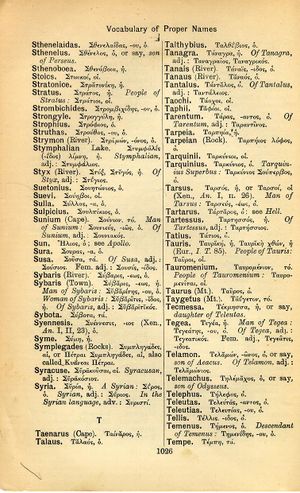Tarsus
Κύριε, βοήθησον τὸν δοῦλον σου Νῖλον κτλ. → Lord, help your slave Nilos ... (mosaic inscription from 4th-cent. church in the Negev)
English > Greek (Woodhouse)
Ταρσός, ἡ, or Ταρσοί, οἱ (Xen., An. I, II. 26).
Man of Tarsus: Ταρσεύς, -έως, ὁ.
Latin > English (Lewis & Short)
Tarsus: i, f.,
I the capital of Cilicia, now Tersoos, Cic. Fam. 2, 17, 1; id. Att. 5, 20, 3; Luc. 3, 225; Auct. B. Alex. 66. — Hence, Tarsensis, e, adj., of or belonging to Tarsus: pelagus, Col. 8, 16 fin.— Subst.: Tarsenses, ium, m., the inhabitants of Tarsus, Cic. Fam. 12, 13, 4; id. Att. 5, 21, 7.
Latin > French (Gaffiot 2016)
Tarsus,¹⁵ ī, f. (Ταρσός), Tarse [ville de Cilicie] : Cic. Fam. 2, 17, 1 ; Att. 5, 20, 3 ; Luc, 3, 225 || Tarsēnsis, e, de Tarse : Col. Rust. 8, 16 || -sēnsēs, ĭum, m., habitants de Tarse : Cic. Fam. 12, 13, 4 ; Att. 5, 21, 7.
Latin > German (Georges)
Tarsus, ī, f. (Ταρσός), die Hauptstadt von Cilicien am Flusse Cydnus, der Sage nach von Perseus erbaut, j. Tarso, Cic. ep. 2, 17, 1. Auct. b. Alex. 66, 2: Persea Tarsos, Lucan. 3, 225. – Dav. Tarsēnsis, e, tarsensisch, aus od. zu Tarsos, Colum.: episcopus, Hieron. – Plur. subst., Tarsēnsēs, ium, m., die Einw. von Tarsus, die Tarsenser, Cic.

